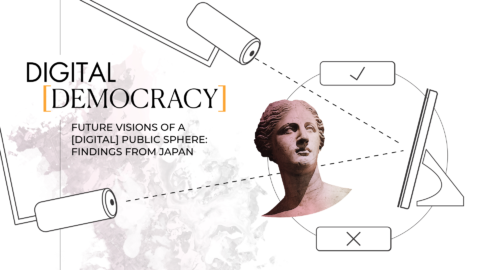
Download
Veranstaltungsort
Online (Zoom Meeting)
Anmeldung
The DIJ Social Science Study Group is a forum for scholars conducting research on contemporary Japan. Meetings are held once a month and are open to speakers from all disciplines of the social sciences. The event is open to all.
Please subscribe to our DIJ Newsletter to stay informed about our research activities, events, and publications:
Future Visions of a (Digital) Public Sphere:
Findings from Japan
14. Juli 2020 / 18:30h (JST)
Michel Hohendanner, Munich University of Applied Sciences
Chiara Ullstein, Technical University of Munich
With the pandemic since early 2020, the use of online platforms has increased in most societies. Consequently, providers of digital platforms have gained substantial influence on how people inform themselves, for example about the novel coronavirus or political topics. However, many posts and publications include falsified or unproven data (better known as “fake news”), also in Japan. Several providers have amended their policies to combat the rise of fake news (e.g. Twitter etc.). These changes of corporate policies and further reactions by several governments regarding the role of such providers illustrate that the structures and communication patterns via these digital platforms are still in motion and, therefore, subject to structural design decisions.
In this talk, Chiara Ullstein and Michel Hohendanner presented findings from an ongoing research project on Digital Democracy at the Kyoto Design Lab (since February 2020). In the course of their research they raised the question how the status quo and the future of the aforementioned digital platforms can be explored collectively with regards to issues like fake news, democratic values or privacy. Therefore, they organized speculative design workshops to collectively generate future scenarios manifested in design applications on these digital public spheres. They argue that the resulting scenarios, which arise from the subjective experiences of their speculators and, hence, reveal individual hopes and fears, allow us to explore and discuss utopian and dystopian visions of technological futures and alternative realities. This method allows for a great variety of participants to create and communicate their own narratives as well as for a broad audience to reflect upon and discuss about these scenarios.
Drawing on their field research in April and July in Japan, they showed that these workshops may result in websites or material artifacts (aka „products“) which address highly topical issues present in Japanese media. These design artifacts are an innovative way to provoke questions and to make aspects visible that matter to the participants while reflecting about multi-layered issues in Japanese society. For instance, Ullstein and Hohendanner presented a kewpie mascot lookalike (aka M.I.Doll) one workshop group developed, which is continuously collecting health data and ought to be carried around by everybody. Like facial masks during the Covid-19 pandemic, these „provocative“ artifacts scrutinize in how far masks have become boundary objects of social conformity, individual freedom, or health practices. A further example presented was a web-based teaching tool on the Internet Safety Regulation (aka Internet Jam) which provides an alternative interpretation to official explanations about its necessity.
The discussion in the Q&A session focused on differences in the use of digital social media such as Twitter in Japan and Germany, including different views on the relevance of privacy and anonymity in both countries. Another point raised concerned the applicability of their projects at universities and schools or by NGOs, NPOs, and other organizations. Ullstein and Hohendanner suggested that similar workshops and projects on digital public spheres could contribute to a better visibility of alternative views in society.
More than 40 participants from all over the world joined this online session.
Chiara Ullstein is a political scientist (MSc Politics & Technology, Technical University of Munich) and visiting design researcher at Kyoto Design Lab (Kyoto Institute of Technology). Her research focuses on the impact of AI on societies, its governance and the exploration and assessment of AI-driven futures.
Michel Hohendanner is a graphic and social designer (MA Advanced Design, Munich University of Applied Sciences) and visiting design researcher at Kyoto Design Lab (Kyoto Institute of Technology). His research interests include design applications linking technological development and social as well as political value systems, especially in the context of digital public environments.


